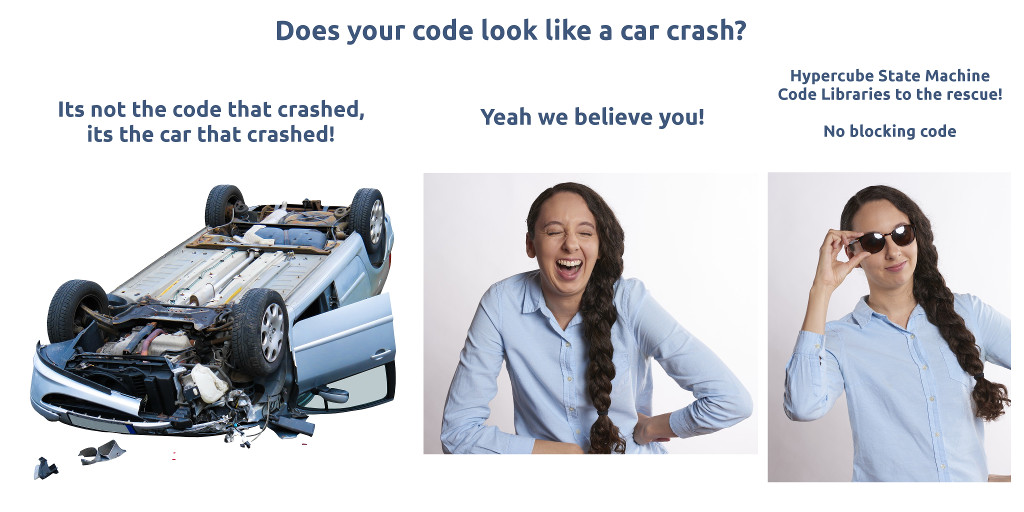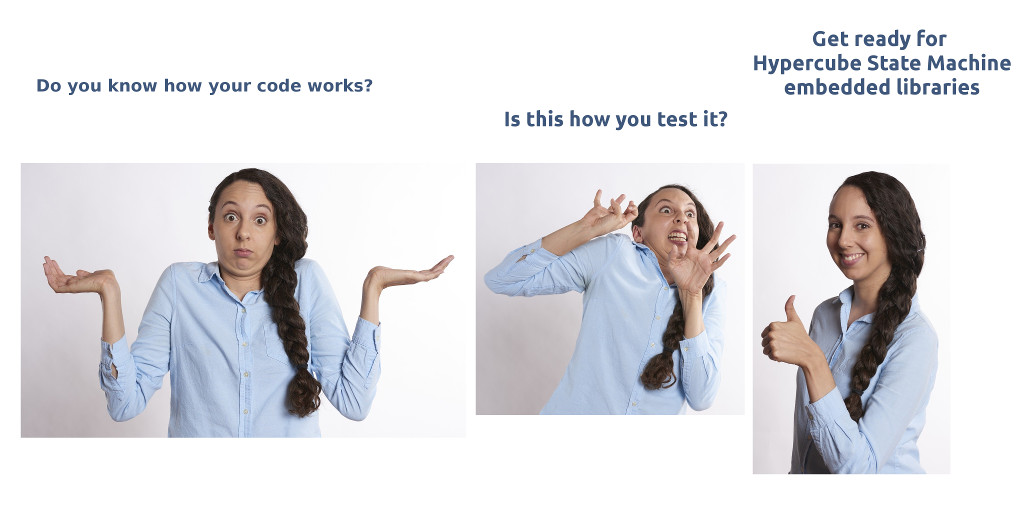|
Home Page
Six Transistor Cache
Investors
Launch Date
Contacts
Terms and Conditions
_________________________
|
Hypercube State Machine Code Libraries
Hypercube State Machine Code Libraries
Hypercube Software
GPL'd Software Libraries Coming Soon...
- All software is to be packaged up as multitasking state machine libraries and open sourced so that if you buy a Hypercube CPU board and a Hypercube Peripheral Board, there is little reason that it should not work right out of the box if you use our embedded state machine software libraries.
- When adding 20 or more boards, the multitasking is designed to work.
- We want to create 'grocery' style design software downloading facility where everything can be clicked and delivered fresh in minutes to get products working.
- The initial offering is for ST based ARM chip boards.
- Later we may offer Allwinner or similar big SoC ARM boards.
- A lot of software is already working, we are holding back for gbit Internet connection, and a launch date thereafter.
Commercial Software
- All software that is GPL'd is available under commercial license. It is identical as possible with the GPL'd code. If you use GPL'd code you must make available publicly the source code for any modification you make if you distribute. If you buy the commercial code, it comes with the commercial license and you are not required to make available publicly the source code or its modification to protect your sales.
- The GPL'd code is NOT a try before you buy item. You cannot start with GPL'd code and convert it to commercial code status by purchasing a commercial license. The issue is that the checksums for software become different under a full audit. If somewhere in there you used GPL'd code, you are still obliged to open source that code even if you purchased a commercial license thinking it negates the GPL license which it does not. You must buy a clean copy of the commercial code and develop with that to satisfy any audits that may be made on your company. These intensive audits are usually carried out during due diligence when a company is being sold, readied for listing in a major stock exchange or being bought out.
- If you used GPL'd code and got a new customer that wants protected code, your option is to not do business with that customer, or buy the commercial code and re-do it for them. In theory, it should be just a matter of doing a diff and updating, but there are no guarantees you might end up tied down in minute details. So our advise is to keep the two versions of software as separate branches at all times, and buy the commercial software if you are working in a commercial environment to avoid these issues in the first place. Its good for us too because we use the revenue to maintain all of the code and expand its workings for your benefit.
- The hybrid of GPL and commercial license is the best software model out there. Pure GPL'd code at times need a lot of work to get it fit and ready for multi-tasking for your projects while pure proprietary code hides all its bad code under lock and seal and no one else can maintain it or improve on it. We got nothing to hide and so maintain all software at commercial grade quality without use of selotape under dual open source and commercial license where many critical eyes are watching and we all win with it.
Networking Subsystem
- We will also provide shared RAM networking so that software can easily communicate between different Hypercube CPU boards.
- Other types of communications such as SPI, I2C, serial etc we convert into an API that presents one uniform interface that emulates shared RAM
Operating System
- For fast code, you need to code in C, and there is a community supported free version of Eclipse that can compile C/C++. The CPUs also work with code written in Arduino IDE. We will provide as many open sourced libraries as is possible to make all our Hypercube boards work together in a multi-tasked environment.
- We will provide Linux on ARM SoC boards based on community support.
- These are intended for higher functions such as servers, SSD, Ethernet networking, WiFI, speech, display, touch interface and so on.
- Any improvements we make (or you communicate to us) is documented to filter up the chain to those who can make better use of this information.
- We also do fat Linux distros containing as many features as we can cram in. This is to help you and many others save time doing repetitive installation tasks which in an ARM can take a long time and which has a lot of broken packages and dependencies that need sorting out due from the porting work from Intel to ARM.
Open Source Software
- All software is intended to be open source as possible
- There is always one thing or the other that is not open sourced or comes with open source violation. Our policy is to distribute whatever we can and let someone use the functionality as is and try to make better versions from it if they have the time and energy to do it, for which we will offer as much support as we can to bring everything closer to open source.
Open Source Hardware
- We will provide in KiCAD schematics for all boards that we support in the form of KiCAD sheets.
- Users will be able to re-mix any sheet and interconnect them, and do the the same in the real Hypercubes to create a finished product in a very short period of time compared to doing it any other way.
- Users can then make their own PCBs and cobble together working firmware in shortest possible time than any other way.
- Users can also commission us to layout the PCBs and make a finished product in the shortest possible time at lowest possible costs to get complex products to market.
Benefits of state machine code libraries
 - All code for embedded systems written like a car crash in slow motion.
- Engineers can become too busy fire fighting to notice that they should be sitting hands folded and feet up thinking through their next project.
- The source is usually rubbish duct tape code buttered on top of blocking code which is deadly for real time systems.
- There is no way to auto pilot the system to discover failure modes when error conditions are injected into the firmware.
- Soon to be released Hypercube state machine code libraries offer a way around this and many other embedded software development problems.
- The most important take away with Hypercube State Machine Code Library is how to write non-blocking code and interface to non-blocking code libraries for real time systems such as drones electric vehicles, mains testers, and critical projects where failure has its consequences.
- Can you write non-blocking code? If answer is yes, can you add 20 more sensors, put it on a drone and still make it fly?
|


